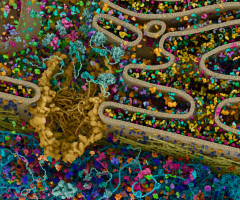
Although advancements in breast cancer detection and treatment have greatly improved patient outcomes, relapse from the disease is still a leading cause of cancer-related death in women.
Recurrent breast tumours typically originate from a subpopulation of cancer cells that survive therapeutic interventions, and they are difficult to identify prior to relapse because they escape cancer therapy through adaptations that help them behave like normal cells.
In a study published this week in the JCI, a research team led by Martin Jechlinger at the European Molecular Biology Laboratory in Heidelberg, Germany examined gene transcription profiles and metabolism pathways in human breast cancer tumours and in mouse models of breast cancer.
They discovered that residual tumour cells display alterations in gene transcription and metabolism that affect how the cells synthesise and store fats.
Changes in fat metabolism were coupled to increases in oxidative stress and DNA damage, suggesting that residual cancer cells rely on these metabolic adaptations to acquire the mutations that trigger cancer relapse.
The researchers then examined pre- and post-treatment biopsies from breast cancer patients and, consistent with their previous findings, they discovered that post-treatment cells exhibited alterations in fat metabolism pathways.
These findings provide important insights into the potential of targeting metabolic pathways in residual breast cancer cells as a strategy to prevent relapse.
Source: JCI
We are an independent charity and are not backed by a large company or society. We raise every penny ourselves to improve the standards of cancer care through education. You can help us continue our work to address inequalities in cancer care by making a donation.
Any donation, however small, contributes directly towards the costs of creating and sharing free oncology education.
Together we can get better outcomes for patients by tackling global inequalities in access to the results of cancer research.
Thank you for your support.